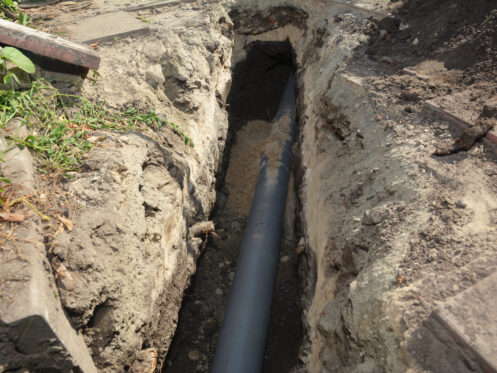Dealing with leaking pipes is a homeowner’s nightmare, and understanding the influence of soil composition on pipe corrosion is critical for property maintenance in Nevada. Leaking pipes not only affect your lawn but can also jeopardize your drinking water and may lead to extensive and costly repairs.
While our plumbers can handle both indoor and outdoor plumbing issues, it’s equally important to recognize how the unique soil conditions in Nevada can impact the inlet and outlet pipes on your property. Lack of proper inspections and maintenance may result in significant problems in the future. Explore the ways the distinctive soil in Nevada can affect your pipes and discover protective measures you can implement.
Understanding the Clay Soil Components
The landscape in Nevada is rich in desert elements, featuring a top layer of rocky and sandy soil. Beneath this surface, compacted clay dominates the deeper layers. Unlike standard soil, clay is denser and will trap water and oxygen underground. This will accelerate pipe erosion. The added weight and pressure from dense clay increase the likelihood of pipes cracking or breaking. While the soil composition in this desert climate can cause a myriad of issues with your pipes, professional landscaping solutions, such as deeper trenches and alternative drainage methods, can prevent moisture and oxygen from causing rapid pipe corrosion. Plumbers may replace pure clay with a stony mixture to enhance airflow and alleviate direct pressure on underground pipes. Each property is unique, hence the reason it is necessary for a thorough evaluation to take place to determine soil composition. Upon receiving the results of the evaluation, plumbers can implement effective solutions to minimize any problems caused by the presence of excessive amounts of clay.
Compaction and Pressure on Pipes
In addition to clay, assessing compaction is essential to gauge potential pressure on the pipes. Compaction occurs when external weight compresses clay or soil, and this will intensify moisture retention. Excessive compaction leads to accelerated corrosion and plumbing complications. Everyday activities like walking may not directly impact pipes; however, certain outdoor installations, such as above-ground pools or swing sets, can exert additional pressure and cause compaction. This heightened pressure, combined with corroding pipes, may result in leaks or pipe bursts. If you notice damp spots or standing water on your property, it can signify that there is pipe corrosion and damage.
How Plumbers Test for Pipe Impaction
Plumbers use various techniques to thoroughly assess the compaction of underground pipes. First, they conduct a comprehensive inspection of the soil composition in areas surrounding the pipes. Using advanced technologies like ground-penetrating radar, plumbers can precisely locate areas where soil compaction is most problematic. During this assessment, professionals also evaluate the depth and density of the soil. In addition to technological tools, plumbers may employ non-invasive methods like video camera inspections to visually inspect the interior of the pipes and identify any compaction-related issues.
Rust Formation and Corrosion
For older homes in Nevada, rust formation in the soil poses a significant concern. Although thick cast iron pipes offer durability, they aren’t immune to the passage of time. Homes built before 1980 require prompt pipe inspections. Even with well-ventilated soil, moisture buildup eventually leads to rust formation. In such cases, re-piping the inlet and outlet pipes with newer materials like plastic PVC ensures cleaner water and prevents future corrosion. Plastic pipes do not corrode, which offers a long-lasting solution for a lifetime without concerns about corrosion.
Harmful Impact of Rust
Rust in the pipes will pose significant harm to both the plumbing system and overall water quality. Over time, the buildup of rust can lead to corrosion and weaken the structural integrity of the pipes. This will increase the risk of leaks or bursts. Beyond compromising the pipes themselves, rust can contaminate the water flowing through them, resulting in poor water quality. This deterioration can affect both the taste and appearance of the water, which makes it unpalatable for consumption. Additionally, rust particles in water can stain laundry, dishes, and plumbing fixtures.
Salt Content and pH Levels
The pH level of soil plays a crucial role in determining whether pipes may be at risk of corrosion. In simple terms, pH is a measure of how acidic or alkaline a substance is, and this measurement directly affects the chemical reactions that occur in the soil. When it comes to pipes, soil with a high pH can lead to corrosion, which poses a threat to their structural integrity.
Soil in its natural state tends to have a certain level of acidity or alkalinity. The pH scale ranges from 0 to 14, with 7 considered neutral. Anything below 7 is acidic, while anything above 7 is alkaline. In the context of pipes, high soil pH can accelerate corrosion. This is because alkaline environments enhance the corrosive potential of water, which can be detrimental to the materials that make up the pipes.
When the soil pH is elevated, it creates an environment that encourages the breakdown of metal pipes. One of the primary factors contributing to this corrosion is the increased solubility of certain minerals in alkaline conditions. As a result, metals like iron in the pipes become more prone to oxidation and deterioration.
In Nevada, the natural clay and sand mixture often results in higher salt content and pH levels. Elevated pH levels accelerate corrosion, making it crucial to monitor soil acidity. Higher salt content impedes soil drainage, which will create conditions favorable for rust formation. Regularly testing the drinking water and soil becomes essential.
Soil pH testing involves the use of specialized kits that include pH meters or testing strips. These tools measure the acidity or alkalinity of the soil by providing a numerical value on the pH scale.
To conduct the test, plumbers extract soil samples from various locations around the pipes, especially targeting areas where the soil may have direct contact with the plumbing system. The collected soil samples are then mixed with distilled water to create a solution, and the pH meter or testing strips are immersed into this mixture. The resulting color change or numerical reading indicates the pH level of the soil.
Understanding the pH levels is crucial for plumbers as it directly influences the corrosive potential of the environment. If the pH is found to be too high or too low, corrective measures can be implemented to balance the soil conditions. For instance, in cases of elevated pH, plumbers may recommend the addition of substances like sulfur or peat moss to increase acidity. Lawn care products and professional plumbing services can reduce salt content and safeguard pipes for an extended period.
Weather Incidents and Pipe Damage
While Nevada’s warm desert climate minimizes traditional four-season weather patterns, extreme weather events can significantly impact pipe conditions. Sudden rain showers can trap excess moisture in the soil, leading to compaction if proper drainage is lacking. Months after a major rainstorm, pipes may exhibit corrosion damage that unknowingly escalates without proper treatment.
Bumble Breeze professionals possess extensive experience in dealing with pipe issues. Our re-piping service ensures the integrity of inlet and outlet pipes, preventing the adverse effects of corrosion on water quality, taste, and pressure. Water quality tests, including pH level assessments, guarantee plumbing will last. Our comprehensive water treatment services, encompassing softeners, purifiers, and whole-home filters, provide reliable protection. Beyond plumbing, we excel in HVAC services, and this includes air conditioning and heating system installation and repairs.
Bumble Breeze goes beyond routine services to reduce your carbon footprint, as we offer radiant heating system installations and a variety of smart thermostats. Contact us to schedule an appointment and ensure the plumbing and HVAC systems in your Nevada home run smoothly for years to come!


